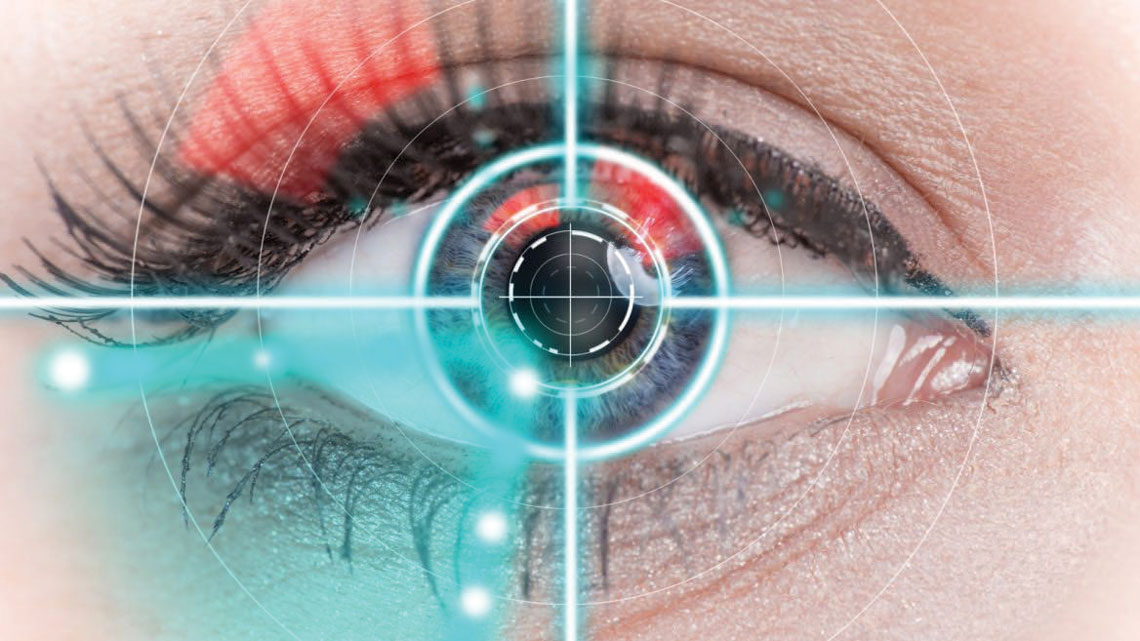
Romantics say that you can see a person’s soul by looking into his or her eyes. Apparently, you also can see whether they eventually will develop Alzheimer’s disease.
The same biomarkers that accumulate in the brain — proteins called beta-amyloids that clump together into sticky “plaque” that are the signs of Alzheimer’s disease — appear in the retina of the eyes up to 15 years before the onset of any symptoms.
Diagnosing Alzheimer’s today is an expensive, invasive and not always readily available process, mainly utilizing PET brain imaging and lumbar puncturing.
But what if all a physician had to do was plug in a portable scanner and train it on a patient’s eyes? That would save money, minimize patient discomfort and make earlier testing much more common.
That’s what excites Eliav Shaked, the founder and CEO of RetiSpec, an Israeli startup that hopes to build and begin testing its unique Alzheimer’s ocular scanner in the next 12 months.
It is hoped that RetiSpec’s scanner can identify the spectral signature of neuropathological changes indicating Alzheimer’s disease in a matter of seconds, Shaked says.
The burden — or, for RetiSpec, the opportunity — of treating Alzheimer’s is clear: It is the most costly disease in North America, costing an estimated $247 billion in the health care system and out-of-pocket costs in 2016. Globally, it’s more than $800 billion. The number of patients worldwide is expected to double to 75 million by 2030 and nearly double again to 130 million by 2050.
There is no cure for Alzheimer’s disease. But early detection would enable people to try diet and lifestyle modifications that may slow the pace or onset of dementia. And they can get prepared financially and emotionally.
“If you knew you could spend more lucid time with your loved ones, if you could extend that even by one year, there’s no way to put a price on that,” Shaked said. “The problem is, by the time we diagnose the disease today, it’s already too late. The Alzheimer’s patient doesn’t understand why they’re in the doctor’s office or who he or she is talking with. It’s devastating.”
There’s another advantage to early testing: Alzheimer’s disease might not be incurable forever. There are dozens of new drugs in the pharmaceutical pipeline, Shaked said, and true preventative treatment could reach the market as early as 2025.
“The biggest need pharmaceutical companies have is to identify people in need of these new drugs before they start to show symptoms,” Shaked explained. “But to screen a large pre-symptomatic population is too expensive. No doctor will send a healthy 50-year-old for an invasive PET scan or stick a needle in his spine just because there’s a history of Alzheimer’s in the family. We can streamline the process and identify people truly at risk.”
RetiSpec started in Israel but temporarily relocated earlier this year to Boston to join the MassChallenge accelerator. MassChallenge has a branch in Jerusalem, but “we chose Boston to be closer to the large medical research community there,” Shaked said.
RetiSpec won first place at the 2016 Partners Connected Health and AARP startup competition in Boston.
The team now is in Toronto collaborating with the Ontario Brain Institute, which in July invested $50,000 in RetiSpec.
“There’s no retinal eye bank in Israel,” Shaked said. “Before we build the scanner, we needed to first collect the data. We feel very fortunate to be part of 2017 Ontario Brain Institute program and to tap into the incredible research community in Toronto.”
The company is raising a seed round and expects to return to Israel in the future.
Shaked, a biomedical engineer with degrees from Tel Aviv University, was inspired to start RetiSpec after he was accepted to a program funded by NASA and Google under the auspices of Singularity University. The program brings 80 entrepreneurs from around the world to Silicon Valley for a 10-week seminar “to educate, inspire and empower leaders to apply exponential technologies to address humanity’s grand challenges.”
For Shaked, that was Alzheimer’s disease. When he was in a Jewish Agency-sponsored summer camp as a teenager, he became close to his adopted “American mother.” She now has Alzheimer’s disease.
“I asked her daughter if I could come and visit her, and she said her mother wouldn’t even recognize me,” Shaked said. “That resonated a lot and impacted me to identify a need.”
RetiSpec is not alone in looking into the eyes of patients to diagnose Alzheimer’s disease. The retina-brain connection was discovered more than a decade ago and there are other companies that track the cognitive and muscular movement of the eye or use conventional ophthalmological technology.
For example, NeuroVision Imaging in California requires patients to ingest curcumin, a component of the spice turmeric, which can penetrate the blood-brain barrier. There it bonds to beta amyloid, the biomarker for Alzheimer’s. A physician can then use a fluorescent imaging scanner to see if the turmeric has made its way to the retina.
Shaked isn’t worried.
“Competition is great,” he said. “It paves the way to the market and changes the mindset about early Alzheimer’s detection. It helps us build our value proposition and moves us forward to clinical studies.”
Shaked added that he feels “deeply driven” to help find a cure for Alzheimer’s disease and likens the process to what we know now about preventing heart disease.
“Imagine someone gets a heart attack and only then the doctor says, ‘OK, now we’re going to start lowering your cholesterol level,’ ” he said.
Just as we can proactively test for high cholesterol, Shaked hopes the same ultimately will be true for Alzheimer’s disease. “Early detection is what will drive prevention.”





















 More news and opinions than at a Shabbat dinner, right in your inbox.
More news and opinions than at a Shabbat dinner, right in your inbox.